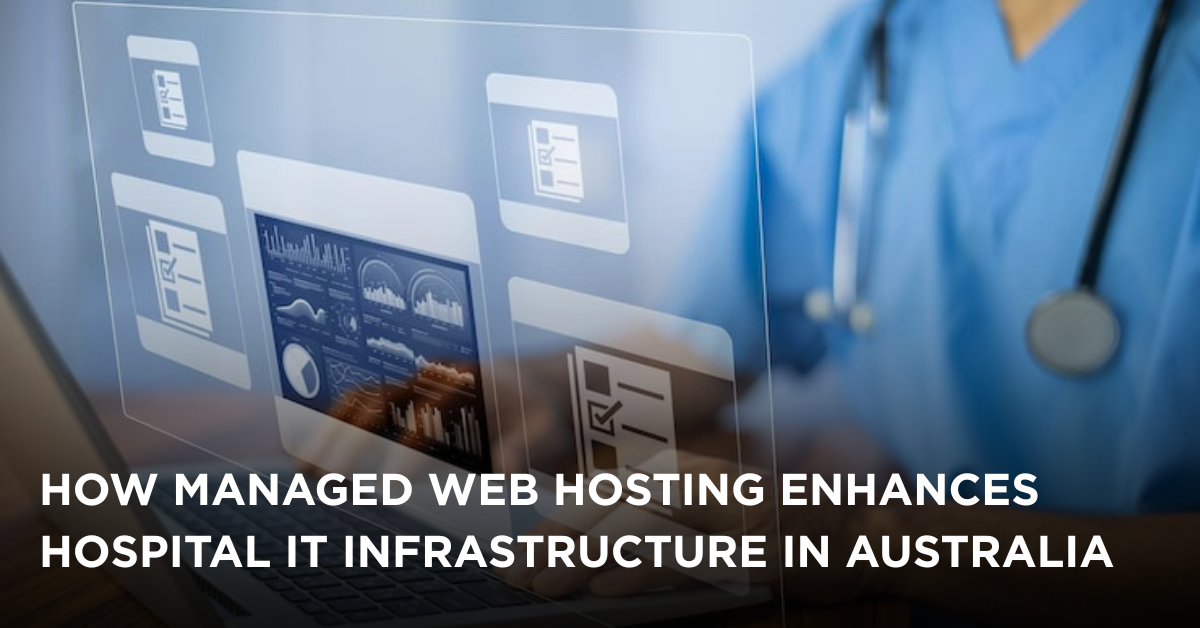Nowadays, every small business it support brisbane cannot function without technology. Daily tasks like creating…

How Managed Web Hosting Enhances Hospital IT Infrastructure in Australia
When you think of a hospital, you probably picture doctors, nurses, and life-saving equipment. You don’t often think about the computer servers humming away in the back room. But what if I told you that those servers—and the Managed Web Hosting that keeps them running—are just as vital to modern patient care as a stethoscope?
Imagine a typical Monday morning at a big hospital in Melbourne. A doctor in the ER quickly pulls up a patient’s medical history on her screen. At the same time, a specialist in Perth reviews a high-quality MRI scan sent from a small town in Tasmania. Additionally, dozens of people use their phones to securely log in and view their test results or book an appointment.
This isn’t science fiction. It’s the reality of modern Australian healthcare. And it all relies on a strong, reliable, and well-managed IT system. For hospitals, a website going down isn’t just a minor hassle—it can disrupt critical care. This is why more healthcare leaders are turning to Managed Web Hosting. It’s not just a tech upgrade; it’s a strategic move that lets hospitals focus on what they do best: caring for people.
Why Hospital IT Teams in Australia Are So Stretched
Before we get into the solution, it’s essential to understand the problem. Hospital IT teams face some unique challenges here in Australia.
- Data Must Stay in Australia: We have strict privacy laws, like the My Health Records Act 2012. This means hospitals must store sensitive patient information on servers in Australia to meet legal requirements. This rules out using many cheap, overseas cloud hosting services and means hospitals need a local partner they can trust.
- There’s No Room for Error: If a popular website crashes, it’s annoying. If a hospital’s patient record system crashes, it’s a serious problem. Surgeries can be delayed, test results can be lost, and doctors can be left in the dark. IT teams are under immense pressure to keep everything running, all the time.
- They’re a Big Target for Hackers: Medical records are incredibly valuable to cybercriminals. Remember the ransomware attack on Uniting Care Queensland? Attacks like these are a constant threat. Hospital IT staff don’t just need to be good at security; they need to be experts who are always one step ahead.
- Traffic Jams and Quiet Days: Demand is all over the place. A new government health campaign might send thousands of people to a booking website in a single hour. Or a new COVID wave might overwhelm a telehealth service. The IT system needs to be able to handle these sudden spikes effortlessly.
- Doing More with Less: Hospital IT budgets are tight. Skilled technicians must maintain critical equipment like heart monitors and imaging machines. They lack the time and energy to become experts in managing complex web servers that require updates at 3 a.m.
It’s a tough spot to be in. This is where the old way of doing things—managing everything yourself—is showing its cracks. And this is precisely where Managed Web Hosting comes to the rescue.
What is Managed Hosting?
The idea of managed web hosting can often seem very complicated or detailed, but it can be made clearer with a useful comparison.
Unmanaged hosting can be likened to purchasing a vacant plot of land. In this comparison, if you are the owner of the land, that means you are taking on all related responsibilities. In responsibilities such as building a structure, managing plumbing and electrical systems. So, all these require the proper implementation of necessary security measures. This task requires noteworthy effort and a wide array of expert skills.
Managed web hosting works like living in an apartment building run by a management team. In this setup, the management company takes care of all maintenance, security, and repairs, allowing them to concentrate on their primary activities. You get to live your life in a safe, well-maintained home without worrying about the leaking tap or the broken elevator.
For a hospital, this building manager does all the technical heavy lifting:
- Watches the servers 24/7 to prevent problems.
- It handles all software updates and security patches automatically.
- Set up reliable backups so data is never lost.
- Provide expert help whenever it’s needed.
This allows the hospital’s own IT team to stop being frantic firefighters and start being strategic planners.
5 Ways Managed Hosting Makes Life Easier for Australian Hospitals
Security You Can Actually Relax About
This is the most significant benefit. With a well-managed host, security isn’t an extra you add on—it’s built into everything they do.
- They use advanced firewalls built to protect web applications, similar to those in secure e-commerce hosting.
- They instantly apply security patches, closing gaps before hackers notice.
- Moreover, they have giant networks designed to absorb cyberattacks, keeping hospital systems online even if someone tries to take them down.
Guaranteed Always-On Performance
The best cloud hosting providers don’t just hope their systems stay up; they build them to be unbreakable.
- They build backups for everything. For example, if one server fails, another in a different Australian data centre instantly takes over. As a result, patients and doctors won’t even notice a thing.
- They fine-tune the servers for speed and use tools called CDNs to make sure a hospital’s website loads instantly for everyone, whether they’re in a city clinic or a rural farm.
The Ability to Grow and Shrink Instantly
The pandemic taught us how important it is to be flexible. Hospitals that use scalable cloud hosting services could quickly expand their telehealth services. Those with old, physical servers couldn’t keep up.
With managed hosting, a hospital IT manager can click a button to add more power during a busy period and then scale it back down to save money when things are quiet. You only pay for what you use.
Taking the Headache Out of the Hospital Website
Most hospitals use WordPress for their main website. While WordPress is great, it can be tricky to keep it secure and fast. This is where managed WordPress web hosting is a lifesaver.
- It comes with security that is pre-configured just for WordPress.
- It’s supercharged for speed, making sure the public website loads in a flash.
- It has simple tools that let the marketing team test new website designs without needing to call an IT expert every five minutes.
Freeing Up Your Best People
This might be the most crucial point. By handing over the day-to-day server chores to the hosting experts, a hospital gets its most valuable asset back: its IT team’s time. These brilliant, highly trained staff can stop worrying about server updates and can start working on projects that help patients, like:
- We’re building a better app to help people manage their health.
- Train the nurses how to use the latest digital tools.
- Integrating new AI technology that allows doctors to make diagnoses.
This isn’t just about saving money; it’s about empowering your team to innovate.
Picking the Right Partner in Australia
If you are thinking about choosing a managed website hosting company for a hospital, it is a big decision. Here’s what to look for:
- Promise of Australian Data: Get it in writing that your data will never leave the country.
- Experience with Healthcare: Choose a provider that already works with hospitals or clinics. They’ll get it.
- No Secrets: They should be happy to provide clear reports on up-time and security.
- They Act Like a Partner: Finally, if you want a company that answers the phone, listens to your problems, and works with you, not just for you.
Conclusion
The way we think about hospitality is changing. It’s no longer just a support function; it’s a critical part of patient care. Managed Web Hosting gives Australian hospitals the strong security and trust they need in today’s digital world. It ensures that doctors have access to the information they require, patients get the access they deserve, and IT teams can focus on improving healthcare.



